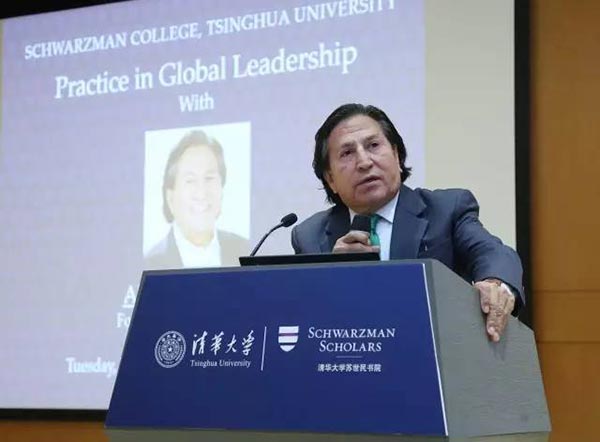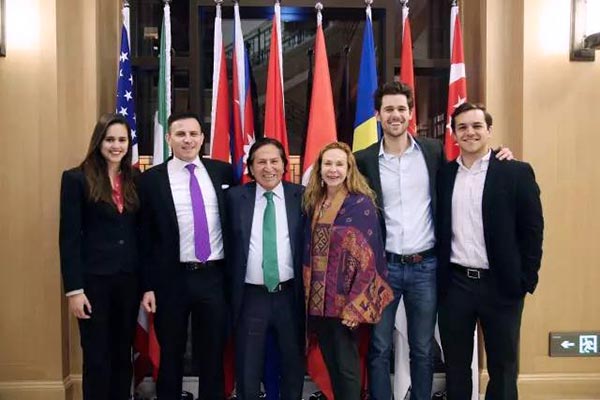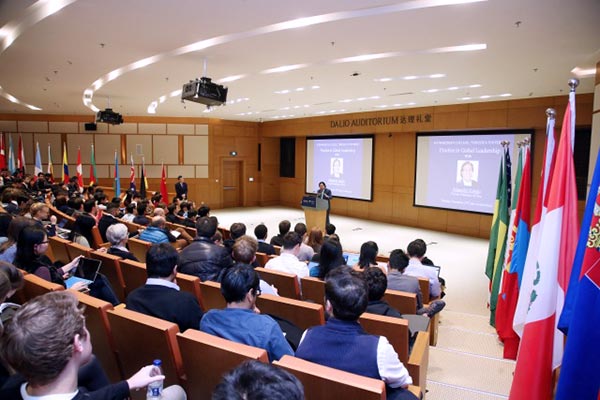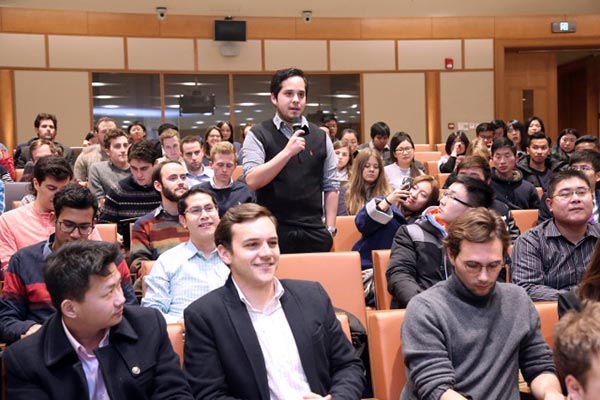On 13th December 2016, the former President of Peru Alejandro Toledo and his wife Elaine Karp-Toledo were invited to Schwarzman College to conduct a guest lecture in the “Practice in Global Leadership” course. The lecture was hosted by David Q. Pan, Executive Dean of Schwarzman College.

Alejandro Toledo delivers the speech
The Toledo couple met with David Pan and some Schwarzman Scholars before the lecture, in which the former president exchanged ideas with the student by answering their questions.

Group photo of the Toledo couple and Latin-American Schwarzman Scholars
Faculty and students from different schools and departments in Tsinghua University attended the lecture. At the beginning of the event, David Pan gave an introduction of Alejandro Toledo’s political life, academic life and experience in the field of economics. Elected in 2001, Toledo became the first South American president of indigenous descent to be democratically elected in five hundred years. He was born into a peasant’s family of 15 brothers and sisters in a village at the altitude of above 2,700m, seven of whom died of starvation. Through unremitting efforts, Toledo became the first child of his family to be enrolled into high school and, later on, received a bachelor’s degree in economics and business administration at University of San Francisco and attended Stanford University, earning a master’s degree in economics and the economics of human resources, as well as a doctoral degree in the economics of human resources in 1993. Before becoming the president, he had worked for the World Bank, the Inter-American Development Bank and the United Nations, respectively.

Mrs. Toledo presents books to Schwarzman College as a gift
Toledo expressed that he was pleased to be invited to Schwarzman College, Tsinghua University, and to take the opportunity to share with faculty and students his understanding and experience of leadership. With his humorous words to describe his wife as a good helper on his road to becoming president, Toledo expressed his gratitude to Mrs. Toledo, an economist and anthropologist, inviting her to give a brief introduction to Peru’s social phenomena in the context of multiple cultures as well as a series of such problems as lack of natural resources and climate change.

The lecture
After that, Toledo recalled his life experience and academic life and drew the conclusion that quality education is the key to cultivating leadership, and that the global future is in the youth’s hands, which was mentioned in his new book The shared society: a vision for the global future of Latin America. According to Toledo, the current world is witnessing a variety of challenges (global population growth, resource scarcity, food safety, climate change, etc.), and the environment will continue to deteriorate in the next generation. The construction of a shared society is his suggestion to cope with current global challenges to ensure survival of the future generations, for which all countries and regions should share with each other power, education and countermeasures against these challenges.
According to Toledo, young people should have a sense of responsibility at the global level, and the reception of quality education helps in fostering their leadership. In his framework, the political elements of leadership include foresight, future orientation, and action, which differentiate political leaders from politicians. The world needs more leaders than politicians. Toledo indicated that Schwarzman College provides an important platform for today’s youth to enhance leadership. He hoped that Schwarzman Scholars can develop a sense of social responsibility and make wise decisions in addressing social challenges at the national and global levels.

Q&A session
The lecture was well-received by students. When asked about making a choice between contributions to the welfare of mankind and loss of group benefits, Toledo reflected on his personal experiences and answered that true leaders should listen to other people during decision-making.
After the lecture, David Pan summarized the essence of leadership in Toledo’s lecture as vision, passion and action, and thanked him again for his wonderful speech.